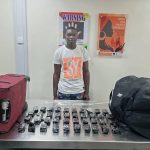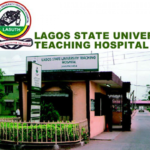Nigeria has fourth largest number of diasporans outside Africa – AfDB
April 28, 2023
Prof. Kevin Urama, Chief Economist and Vice President, Economic Governance and Knowledge Management, African Development Bank(AfDB) Group, says Nigeria ranks fourth among African countries with large numbers of diasporans outside the continent.
Urama disclosed this in Abuja while speaking on“ Diaspora Funding for Africa’s Development” at the Global African Diaspora Symposium on Building Stronger Connections between Africa and the Global Diaspora on Thursday.
“Nigeria is one of the countries with large numbers of Diasporans. The Nigerian Diaspora living outside Africa has tripled between 2000 and 2020.
“While Nigeria ranks fourth among African countries with large numbers of Diasporans outside the continent, the extra-continental Nigerian diaspora has tripled in two decades.
“From 320,000 people in 2000 to about one million in 2020. About 58 per cent of Nigeria’s diasporans live outside Africa, while 42 per cent live in Africa,’’ he said.
Urama said the African Union (AU) estimated that 70,000 skilled professionals emigrate from the continent annually, noting that in 2015, African-trained medical graduates practising in the US reached 13,584.
He said: “The Mo Ibrahim Foundation assessment `Brain Drain: A bane for Africa’s potential’ found that in 2015, 86 per cent of all African-educated physicians working in the US were trained in Egypt, Ghana, Nigeria and South Africa.
“A significantly large number of Africans in the Diaspora are excelling in medicine, robotics, space engineering, nanotechnology, architecture, engineering, public policy, academia IT and literature.
“Other fields where they excel include the media, sports, entertainment, the public domain of politics and the private sector in different parts of the world.’’
According to the economist, there has never been a more fitting time than the present for us to unite, work together, and help build a formidable, dynamic and prosperous continent.
Urama said: “Development is a Do-It-Yourself (DIY) business. Africans should take the proverbial “bull by the horns”; do what is right for Africa. By working together, we can build the Africa we want.
Speaking on diaspora financing in supporting Africa’s development, he said that the African diasporans were invaluable assets for Africa’s development and their countries of residence around the world.
He said all Africans, living in Africa, migrants living outside Africa and people of African descent living in other continents around the world, constitute “The Global Africa”.
The economist said they also had the inherent desire and responsibility to proactively build the Africa we want.
Urama listed key areas African diasporans could finance and support Africa’s development, including securitisation of remittances, diaspora bonds, trade and investment promotion, research, innovation, knowledge, technology transfer and brain circulation.
Speaking on the key areas, he said diaspora remittances to Africa had increased significantly over the past decade, from 53 billion dollars in 2010 to about 100 billion dollars in 2022.
According to him, the flow of remittances to African countries has remained stable and predictable, making it a formidable source of financing for African development.
“Nigeria is one of the major remittance recipient countries in Africa.
“With an estimated value of 19.5 billion dollars in 2021 and 21 billion dollars in 2022, accounting for almost 20 per cent of the continent’s total value of remittances in both years.
“This makes Nigeria the first recipient country in sub-Saharan Africa and the second in Africa, after Egypt, which received 31.5 billion dollars (30 per cent of the total remittances) in 2021.
“Egypt, Nigeria, Morocco and Ghana alone accounted for almost 70 per cent of the total value of remittances in Africa in 2021.
“These were not debts. There were 100 per cent gifts or grants, a new form of concessional financing that is the key for livelihood security for millions of Africans,’’ the economist said.
Urama said the impact of remittance flows on economies was quite significant as they ensured stable source of income and eased consumption and other immediate livelihood needs for families, especially during crises.
He said they contributed to reducing growth volatilities, as seen in the Philippines, Mexico, Pakistan, India, and others; provided alternative financing investments; helped boost domestic savings and contributed to financial intermediation.
The economist said the role of remittances in promoting investments could be significantly enhanced by securitising them.
According to him, securitisation of remittances can enhance the credit rating of financial assets by mitigating currency convertibility risk, a key component of sovereign risk.
On diaspora bonds, he said their issuance allowed the diaspora to participate in the region’s development, irrespective of the size of investible funds.
He said this gave African countries a useful mechanism to mobilise external funds for investment while lowering investment risk.
On trade promotion, he said the African Diaspora could increase essential market information for trade by helping origin-country exporters find buyers, improve their market knowledge, and comply with government requirements and market standards.
“They can also facilitate bilateral trade and investment between host and origin countries as they can help overcome information asymmetries and other market imperfections.
“They can use language benefits or cultural background to ease communication and better understand business documents, procedures, and regulations.
“They can also directly invest in their countries of origin as this will help to promote business development, job creation, innovation and business networks.
On research, innovation, knowledge, and technology transfer, the economist said skilled African Diaspora and country networks abroad could contribute to capacity development through diaspora organisations in the host countries.
Urama, while speaking on brain circulation, said returning migrants/diasporan could also bring back new skills, knowledge, technology, connections, norms and democratic values.
“Skilled emigrants can have an important role in the transfer of knowledge and technology.
“From the most developed to the less developed world through formal and informal networks thus encouraging brain circulation, which could promote sustainable development in Africa,’’ he said. (NAN)








